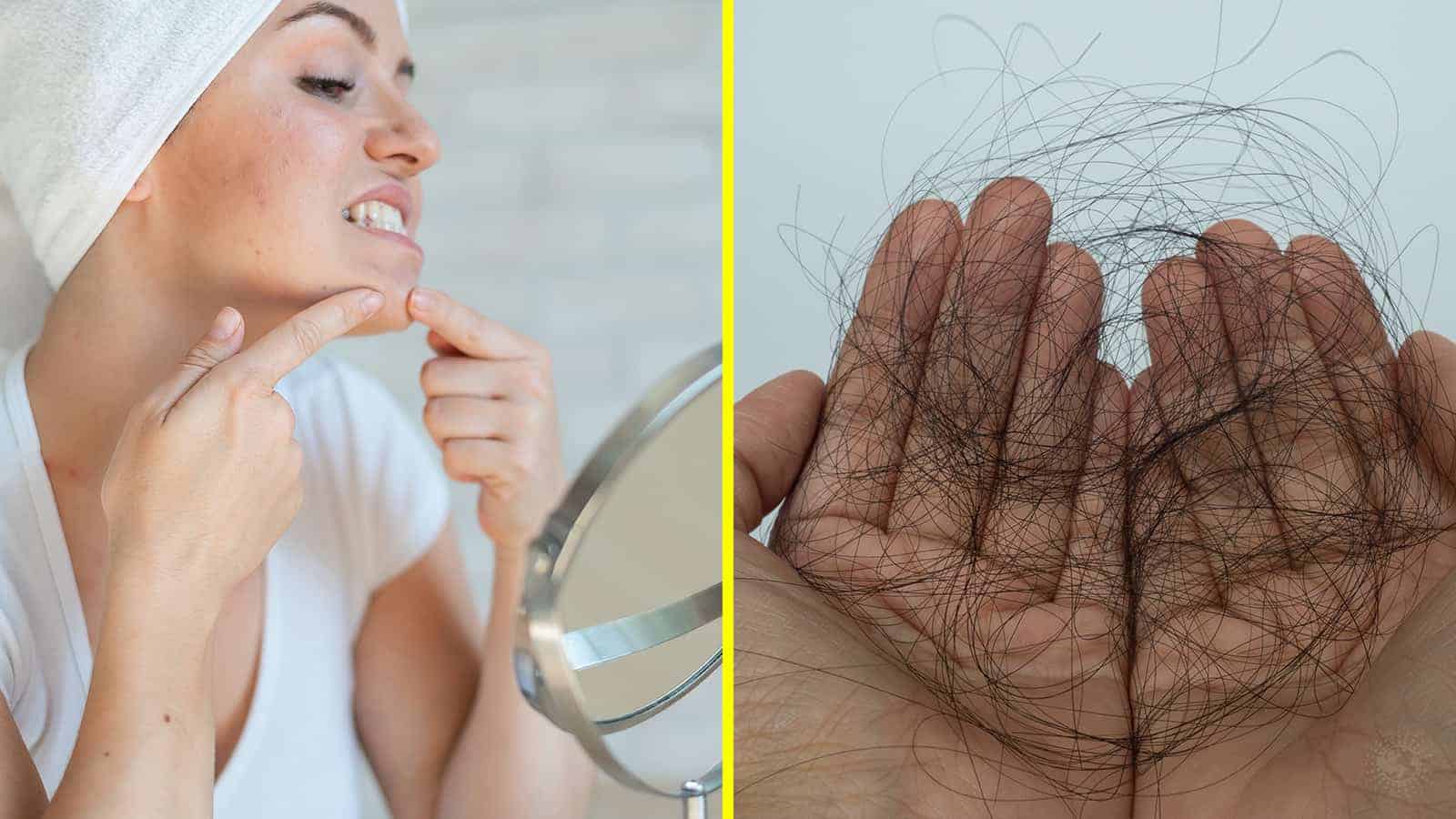Are you suffering from a hormonal imbalance? When you mention hormones, people automatically think of a teenager with acne that they can’t control. Another thought that comes to mind is a pregnant woman with mood swings and cravings that drive her to tears.
While those things are examples of hormonal problems, things take a dramatic shift during menopause that is not so kind. Dealing with zits and pregnancy problems can be severe, but nothing prepares a lady for hormonal fluctuations during menopause.
You might be tempted to take some hormonal replacement that can help you through this challenging time, but it’s not advisable as these are known to increase your chance of cancer.
These Twelve Symptoms Indicate a Potential Hormonal Imbalance in Women
How do you know if you’re having hormone problems, and can you combat these issues naturally? Here are some signs of a hormonal imbalance and your body is reeling from the fluctuations.
1. Hot Flashes
Perhaps the most famous hallmark of a hormonal imbalance is hot flashes. Do you feel like one minute you could stand on an iceberg and still be hot, and the next, you’re under a pile of covers? These are signs that your hormones are fluctuating.
When your estrogen level drops, it signals to activate the brain’s region that controls temperature, the hypothalamus. Your body quickly tries to step in and accommodate for the loss of these vital hormones, but all it does is make you feel uncomfortable.
2. Unable to Focus
You have several neurotransmitters in your brain that help you regulate your body. Estrogen is one hormone that allows you to control your serotonin, dopamine, and norepinephrine. When estrogen is low, your hormonal imbalance is more noticeable as your neurotransmitter supply depletes.
3. Skin Pigment Issues
No one wants to deal with pigment issues, also called liver spots. Yet, these unsightly issues appear in the 40s and 50s.
Hyperpigmentation is caused by the body not repairing damage from the sun and other factors as quickly as in the past. It’s best to wear high-strength sunscreen to prevent these spots from forming.
4. Weight Gain
When your hormones are out of whack, your weight can fluctuate. Most women notice they get what is known as “middle-age spread” as the weight gain takes hold. Your hormones control your metabolism, so an imbalance can cause it to be sluggish.
Your metabolism naturally slows as you age, so you must be careful about bingeing a box of cookies, as your body can’t get rid of those calories as quickly as before.
5. Excessive Sweating
A woman’s body seems like a pop song, “You’re hot, then you’re cold.” It’s because your internal thermostat is on the fritz. Not only will you experience hot bursts, but you will also wake up in a puddle of sweat.
Keeping a fan on you at night can help combat the excessive heat your body is trying to eliminate. Don’t get too frustrated with yourself; if you dress to accommodate your sweat, you will be freezing and need a blanket.
6. Facial Hair
As if life isn’t cruel enough during menopause, you now have hairs popping up in places where they don’t belong. Hirsutism is male-like hair growth that appears on a woman’s body and is a pain. You may notice you can grow a beard or mustache like your husband.
Don’t panic when you see these extra hairs and don’t shave them off either. Shaving only makes them coarser and blunter, which feels awful to the touch. Many methods exist to remove these hairs permanently and without using a razor.
Do you want to walk around with a five o’clock shadow? This is one time when you need lasers to remove these hairs to live your life without embarrassment.
7. Moodiness
Do you ever get so cranky that you can’t stand being around yourself? It happens to all women as they go through “The Change.” You feel like your body is giving out on you and doing things you never thought possible.
The hormonal imbalances can get the best of you, and it will display in your mood. Try to go easy on your family, as they need you. If you notice that your attitude is off and you feel like you could snap at someone who even looks at you, consider herbal mood stabilization treatments.
When your hormones are shifting, and all over the place. But you don’t want to take it out on your family. Many natural remedies can help you with this issue, such as St. John’s Wort.
8. Menstrual Cycles are Erratic
Not only are you unable to focus, moody, and having hot flashes, but you will also notice that your periods are erratic. You might even feel you’re pregnant when you start missing your periods.
Never rule out pregnancy in the late 40s and even into the early 50s because the change of life babies will pop up. If you’ve always been regular, you may find it hard to track your cycle when it never comes when it should, is heavier or lighter than usual, and seems to have a mind of its own. Many women have a procedure called an ablation that burns away the uterus’ lining when their periods become too heavy to manage.
It’s the luck of the draw as to what your cycle will do. It may just go away peacefully, and you will never have to deal with it again, or it may go out with a vengeance. Just don’t make any plans to set your calendar by each month due to all the hormonal imbalances in your body.
9. Hair Starts to Fall Out
The one thing you thought you could always count on is your gorgeous locks, and now you see a pile of hair in the shower drain after you bathe. It’s terrifying to see your hair get thinner as it falls out. It’s yet another problem caused by your hormones.
You should know that many things can change your hair, including your thyroid. So, if you see bald patches and thinning, it might not be because of menopause entirely. Alopecia areata is a common problem that affects both men and women.
Though you may find it embarrassing, most stylists know how to cut your hair to hide the thinning or bald spots. A new hairdo may be just what you need. When the areas become too large or the thinning too great, you can try hairpieces or wigs to help cover them.
Treatment options that treat the scalp directly are available, but most find that as soon as they stop using them, the hair they gained quickly falls out.
10. Pimples and Skin Blemishes
You thought you were done with pimples and facial blemishes, but you are going through menopause and dealing with adult acne. You must ensure you don’t have rosacea, a form of blemish that can look like regular acne.
If it’s not rosacea, you see an outward manifestation of an inner hormonal imbalance. There are many things that you can do to combat this problem. Tea tree oil is among the best if you want an all-natural treatment. Mix a few drops of this essential oil into a mask and apply it to your face.
Tea tree oil is known for its antibacterial and antifungal-fighting properties. Each of those can contribute to the formation of a blemish. It’s by far the most used natural remedy because it works. There’s no use in wasting money on over-the-counter creams that care for the blemishes and dry the skin horribly.
11. Headaches
All these changes in your body can cause headaches. There are many types of head pains, and various things cause them. You may experience stress and tension from muscle aches and discomforts, causing neck and back aches.
When your back or neck is out of alignment, it can cause severe headaches. Just note that these are common occurrences that will probably stick around during these times of fluctuation. Headaches may indicate many health issues, so see a doctor if they persist.
12. Digestive Issues
Another problem you might notice is digestive issues. You may experience gas, bloating, and other problems like diarrhea or constipation. So you must monitor the foods you eat to combat your problems. Additionally, you may need to boost your fiber intake and decrease your carbohydrate and fat intake. This adjustment might take a touch of trial and error, but it will offer you tremendous relief.
 Final Thoughts on Identifying a Hormonal Imbalance
Final Thoughts on Identifying a Hormonal Imbalance
Menopause can be an exceedingly difficult time in a woman’s life, but it’s nothing that you can’t overcome. Try something natural to calm your hormonal imbalance before going to your doctor to get estrogen replacements. Many foods and spices high in estrogen can help with the fluctuations. There are many ways to combat this difficult time in life. But this phase pass – your body will soon level out, and you will experience a new normal.




















